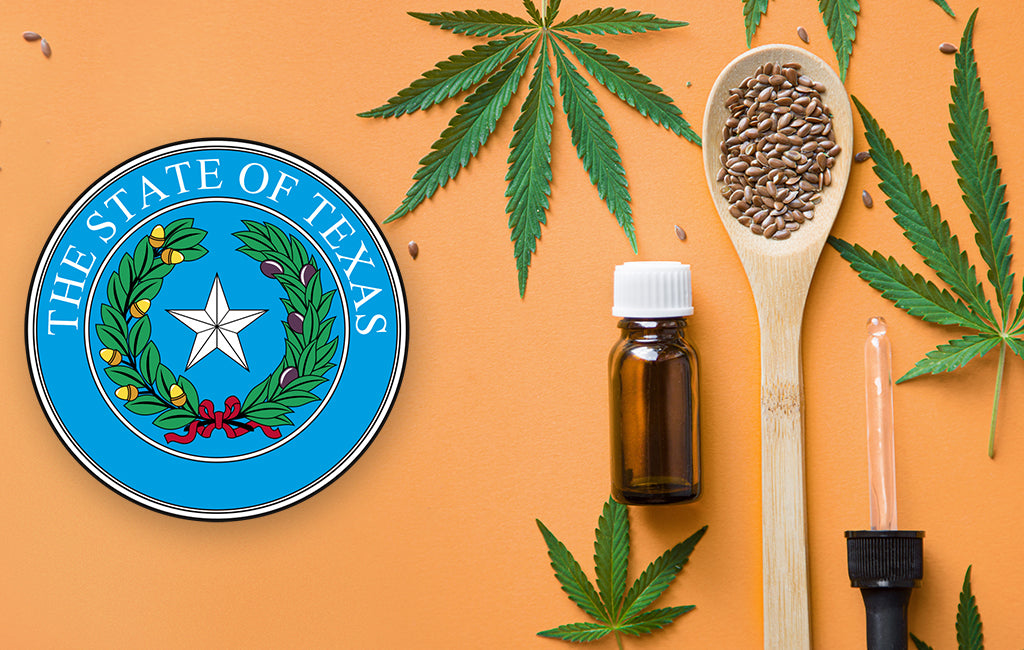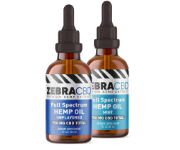
In addition to being known as the Lone Star State, Texas is also famed for being home to The Alamo and Tex-Mex cuisine. Most recently, however, it’s become one of the many states that legally permit the sale of CBD.
In 2018, the Farm Bill legalized hemp at the national level, allowing hemp-based CBD products containing less than 0.3% THC to be produced, manufactured and sold in states throughout the country, including Texas.
CBD vs THC
CBD (cannabidiol) and THC (tetrahydrocannabinol) are two cannabinoids found in the cannabis plant, but they have distinct effects and legal statuses in Texas. CBD is non-psychoactive, meaning it does not produce the "high" associated with THC. Instead, CBD interacts with the body’s endocannabinoid system to support balance and wellness. THC, on the other hand, is psychoactive and binds to CB1 receptors in the brain, causing euphoria and other mind-altering effects.
In Texas, hemp-derived CBD with no more than 0.3% THC is legal under the 2018 Farm Bill and the Texas Industrial Hemp Program. However, THC remains classified as a Schedule I substance under the Texas Health and Safety Code, and possession of THC-containing products is strictly prohibited. Even small amounts can result in criminal charges, with penalties ranging from misdemeanors for minor offenses to significant felonies for larger quantities. Efforts to change these laws, such as decriminalizing marijuana and reducing marijuana possession charges, have gained traction but have not yet succeeded.1
Efforts to legalize marijuana in Texas have been ongoing, with momentum increasing in recent years. During the 2019 cannabis legalization discussions, lawmakers made incremental progress, including updates to the Compassionate Use Program, which now allows limited access to low-THC medical cannabis for patients with certain qualifying conditions.
In the 2021 legislative session, additional bills aimed at expanding marijuana access and reducing penalties for possession were introduced, though few advanced. Public sentiment appears to support reform, as highlighted by the University of Texas/Texas Tribune Poll, which found that a majority of Texans favor legalizing marijuana in some form. These evolving discussions suggest a gradual shift toward broader acceptance of cannabis in the Lone Star State.
Is CBD Legal in Texas?
So, is CBD oil legal in the Lone Star State? In short, yes, CBD is currently legal in Texas, but it was not always so.
Until the 2018 Farm Bill was enacted, CBD products were illegal to produce, manufacture, sell or use in Texas. Once the bill was passed, hemp and hemp seeds were removed from the Drug Enforcement Administration’s (DEA) controlled substance list. This meant that, federally speaking, CBD products such as oils, topicals and edibles would become legal in the United States.
It was then up to each state to establish its own procedure regarding how it planned to administer its hemp program. Texas formulated House Bill 1325, which established more defined laws concerning the production, manufacturing and retail sale of hemp-related products. After the bill was signed in June of 2019, CBD officially became legal, so long as the products contain below 0.3% THC concentration.
The bill also decreed that the Texas Department of Agriculture should work with the Department of State and Health Services to create and adjust the hemp rules and regulations in the future as needed.
Texas also established the Texas Compassionate Use Program (TCUP), which permits the medical use of low-THC cannabis for certain qualifying conditions. Under TCUP, patients with conditions such as epilepsy, autism, PTSD, cancer, and other debilitating conditions may access cannabis oil containing no more than 1% THC concentration. Licensed dispensaries provide these products to registered patients, ensuring safe and regulated access.
So, CBD is legal in Texas, and there are few legislations regarding how old to buy CBD in Texas. As such, there are no age restrictions when purchasing CBD oil or other CBD products, although some licensed retailers may ask customers to be at least 18 years old. That said, it is up to the discretion of the owner to make that decision.
It’s important to note, however, that the CBD laws in the state of Texas may change in the future as federal and state regulations develop.
The Specifics of CBD Laws in Texas: What You Need to Know
Is CBD illegal in Texas? No. Shortly after the Farm bill was passed to legalize CBD, Texas signed House Bill 1325, authorizing the following:
- Summation – Under federal and CBD Texas laws, “hemp” has been removed from the list of controlled substances. Because of this, the production, manufacture, retail sale and inspection of hemp products are legal in Texas. This includes CBD oil and other edible parts of the plant.
- Testing regulations – Hemp and marijuana come from the cannabis plant and contain CBD. However, hemp contains 0.3% or less of tetrahydrocannabinol (THC), the compound associated with creating a “high.” Under House bill 1325, any hemp-related product must be tested for its THC levels and contain 0.3% or less to be considered legal and therefore given the green light to sell and use.
- Testing required– According to Sec. 443.151. of theTexas Health and Safety Code, a sample of the plant must be tested to determine the total concentration of cannabinoids. The sample will also be tested to determine the amount of heavy metals and pesticides it contains and the amount of harmful microorganisms and residual solvents used in processing.
In addition to House Bill 1325, other general guidelines stipulate additional CBD oil Texas legality conditions: You can use CBD oil and consume food-based CBD products purchased in Texas.
In addition, any CBD product that has more than 0.3% THC is still considered a controlled substance and is therefore illegal to purchase, use or travel with. The only hemp product that is prohibited for sale and use is one intended for smoking purposes, according to Sec. 443.204. of the Texas Health and Safety Code.
Can I Buy CBD in Texas?
Once CBD products pass Texas’ required testing, they’re available for purchase throughout the state in licensed in-person stores and online shops.
At dispensaries, you can purchase full-spectrum, broad-spectrum and CBD isolates in the form of gummies, chewables, CBD oil and more. You can even purchase beverages at coffee shops or restaurants with CBD oil mixed in.
Can I Buy CBD Online?
In Texas, you can buy CBD through online retailers all over the country. Many CBD users prefer the luxury of purchasing their CBD products through licensed online stores because they typically offer a larger inventory of items, including topicals, oils, edibles and even CBD products for pets. Not to mention, you often find lower prices at online stores because you can use coupon codes, bundle your items and receive member discounts.
Another advantage is that users can easily do a background check on the retailer they’re interested in buying from. Many online suppliers like Zebra CBD provide a Label Accuracy Guarantee to provide evidence that all products have been reviewed and tested by third-party labs. This ensures each product meets the CBD and THC content claims on the label.
Can I Buy CBD at a Dispensary?
Those in Texas interested in seeing the products firsthand before purchasing can visit a licensed cannabis dispensary. There, associates can answer any questions you have about CBD products and you can walk out the same day with your products in hand.
Can I Travel With CBD?
If you’re planning to travel with CBD, it’s essential to understand the rules and regulations to ensure a smooth journey. Whether traveling within Texas, across state lines, or internationally, following the proper guidelines can help you avoid unnecessary complications.
Traveling Within Texas and Across State Lines
When traveling within Texas, hemp-derived CBD products containing less than 0.3% THC are permitted, provided they meet state regulations. You can transport CBD products in your car or personal belongings without issue, but always ensure that your products are clearly labeled and compliant with Texas hemp laws.
If you’re crossing state lines, the federal legality of hemp-derived CBD under the 2018 Farm Bill means you can generally travel with CBD. However, it’s essential to research the laws of your destination state, as some impose stricter rules. But, is it legal to fly with CBD? For air travel, the TSA permits CBD products with less than 0.3% THC, but keeping them in their original packaging with a Certificate of Analysis (COA) is recommended to confirm compliance.
Can I Travel With CBD Internationally?
If you’re planning a trip out of the country, you may be wondering “can I travel with CBD internationally?” Traveling internationally with CBD from Texas requires more caution due to varying regulations abroad. Some countries allow hemp-derived CBD, while others strictly prohibit it, regardless of THC content. Before traveling, research the destination country’s rules on CBD and check whether additional documentation, like a COA, is required.
Always carry CBD in its original packaging and keep it in your carry-on bag if flying. International laws regarding CBD are often stricter than in the U.S., so it’s crucial to verify the latest regulations before leaving. When in doubt, consult with the appropriate authorities to avoid issues at customs or during your travels.
Shop CBD in the Lone Star State with ZebraCBD
Whether you’re looking to manage stress, support wellness, or explore the benefits of CBD, quality matters. At ZebraCBD, we’re committed to providing premium, hemp-derived products that meet Texas’ regulatory standards and support your health goals.
From our CBD topicals to our CBD hemp oil for sale, every CBD product is crafted with care, backed by third-party testing, and covered by our Label Accuracy Guarantee™. Whether you’re a Texas resident or visiting the state, ZebraCBD offers reliable, effective solutions to enhance your wellness routine.
Shop with us today and experience the difference of trusted, high-quality CBD.
FAQs
-
Is CBD legal in Texas?
Yes, CBD is legal in Texas when purchased from licensed dispensaries or online retailers. -
How old do you have to be to buy CBD in Texas?
There are no legal age restrictions when purchasing CBD in Texas. - Can I sell CBD products in Texas?
To sell CBD products in Texas, you’re required to have a state license, which is renewed yearly. - How has legalization impacted the CBD market in Texas?
The legalization of hemp in Texas through the 2019 Texas Hemp Bill has led to a booming CBD market, with products widely available in stores and cafes across the state. Increased consumer awareness and the reduction of stigma have contributed to the expansion of brick-and-mortar locations and online CBD businesses, creating a thriving industry for hemp-derived CBD products.
Legal Disclaimer
The information contained above is provided for educational and informational purposes only, and should not be construed as legal advice. The provided information may not reflect current legal developments or information, and is not guaranteed to be correct, complete or current. We recommend checking our source(s) to see if the information or legal status has been revised since our content was published.
Sources:
- Texas Department of Agriculture. Texas Industrial Hemp Program. https://www.texasagriculture.gov/Regulatory-Programs/Hemp
- Texas Constitution and Statutes. Health and Safety Code. https://statutes.capitol.texas.gov/Docs/HS/htm/HS.443.htm#443
- Texas Tribune. CBD Products Are Everywhere in Texas Since the State Legalized Hemp. Experts Warn: Buyer Beware. https://www.texastribune.org/2020/01/23/texas-cbd-products-are-everywhere-heres-what-you-should-know/
- Scarinci Hollenbeck. Key Takeaways From the FDA’s Review of CBD Products for Mislabeling and Adulteration. https://scarincihollenbeck.com/law-firm-insights/cannabis-law/fda-review-cbd-products-mislabeling
- NORML. Texas Laws and Penalties. https://norml.org/laws/texas-penalties-2/
- The Texas Tribune. Is marijuana legal in Texas? What you need to know about the state’s pot laws. https://www.texastribune.org/2022/07/18/texas-marijuana-laws-2022-law-legal/









